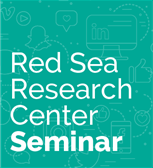




 Speaker 1: Collin Williams
Speaker 1: Collin Williams
Title: Recreational Angling as a Conservation Strategy: a Case Study of Bonefish and its Viability in Saudi Arabia
Abstract: Recreational fishing is an economically important activity that takes place around the world. The increasingly popular practice of catch-and-release fishing provides similar economic advantages with lessened impacts on fish stocks. Many fish species popular with catch-and-release anglers are found in the Red Sea along Saudi Arabia's coastline. In particular, the bonefish (Albula spp.), well known for supporting lucrative recreational fisheries, is commonly found in the mangrove areas around Thuwal. Bonefish also regularly appear in local Saudi fish markets. Certain aspects of bonefish biology in the Red Sea have been investigated aimed at informing management. This information is important as increased tourism to the Kingdom will likely bring with it recreational fishermen and there will be a need to balance harvest and release fisheries.

 Speaker 2: Dr. Thomas DeCarlo
Speaker 2: Dr. Thomas DeCarlo
Title: There's more to coral bleaching than temperature
Abstract: Mass coral bleaching events are degrading coral reefs, impacting the livelihoods of the hundreds of millions of people who depend on these ecosystems for employment and sustenance. Nearly all studies on coral bleaching implicate temperature as the sole or primary driver of bleaching, and it is often suggested that global warming is entirely responsible for the increasing frequency of bleaching in recent decades. However, the number of bleaching events per reef is not correlated to the rate of local warming since pre-industrial times, suggesting that other factors in addition to temperature are involved. Here, we used a combination of coral skeletal cores and ecological surveys to build timelines of bleaching events over the past several decades on the Great Barrier Reef (GBR) and in the Red Sea. We then investigated the causes of bleaching with remote sensing and ocean reanalysis products. In both reef systems, severe bleaching occurred when anomalously high temperatures coincided with currents conducive to upwelling of nutrient-rich waters. Similarly, the hottest summer on record at each of the GBR and Red Sea caused only minor bleaching because anomalous currents dampened upwelling at these times. Our results indicate that excess nutrients can exacerbate the effect of heat stress in causing coral bleaching, consistent with the findings of multiple laboratory studies. Changes to ocean currents in response to climate change could, therefore, play a key role in modulating the sensitivity of corals to continued global warming. Incorporating oceanographic processes, such as current-driven upwelling, into coral bleaching forecasts is likely to improve our predictive ability beyond existing systems based solely on temperature.